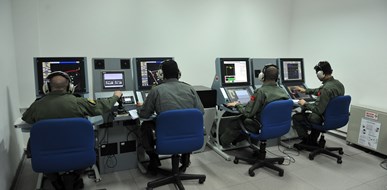[Blog] ‘Meaningful human control over autonomous weapons and International Criminal Law’
Published 17 December 2020
©Shutterstock
In a contribution to international law blog OpinioJuris, Asser researcher Marta Bo writes that international criminal law could provide guidance for operationalising the concept of meaningful human control over lethal autonomous weapons (LAWS). Bo suggests that a treaty obligation on meaningful human control must therefore be adopted and articulated in terms of legal duties to act on individuals. It must ensure that human operators are capable to exercise the duty to take precautions: ‘Under these conditions, criminal responsibility for failing to stop unlawful attacks launched by autonomous weapons is fairly attributed.’
Background
Last year, UN Chief Antonio Guterres tweeted that ‘machines with the power and discretion to take lives without human involvement are politically unacceptable, morally repugnant and should be prohibited by international law’ Should we leave the decision to kill a human being to a machine?
Lethal autonomous weapons (LAWS) have long raised moral and legal concerns. While civil society and academia were quick to raise concerns surrounding responsibility (and in particular the so-called responsibility gap), international regulatory discussions have only recently opened up to the issue of accountability.
In international discussions and writings, the problem of meaningful human control has been addressed from different angles: from philosophical, ethical and legal (here and here), to operational, cognitive and technical (here and here). In her OpinioJuris blog post Marta Bo suggests that meaningful human control must be shaped so that individual criminal responsibility for unlawful attacks amounting to war crimes can be attributed.
Criminal responsibility by omission
She further argues that the failure to stop human-supervised autonomous weapons will be one of the most common situations arising when these weapons are deployed causing the violation of the principle of distinction or proportionality. Criminal responsibility by omission - where accepted - will acquire a key role in the prosecution of war crimes committed in scenarios where supervised autonomy is employed in targeting. However, where ‘commission by omission’ of conduct of hostilities war crimes is not accepted, the criminal responsibility gap would be potentially wider than has been thus far acknowledged.
According to Marta Bo, a treaty obligation on meaningful human control must be adopted and articulated in terms of legal duties to act on individuals and must ensure that human operators are capable to exercise the duty to take precautions. Under these conditions, criminal responsibility for failing to stop unlawful attacks launched by autonomous weapons is fairly attributed.
Read the full blog post here.
 Dr. Marta Bo, is a researcher at the Graduate Institute (LAWS and War Crimes Project) and at the Asser Institute. She is currently working on criminal responsibility for war crimes committed with autonomous weapon systems; AI-crimes and criminal responsibility; automation biases and mens rea for crimes committed with autonomous or automated systems; disarmament and criminalisation.
Dr. Marta Bo, is a researcher at the Graduate Institute (LAWS and War Crimes Project) and at the Asser Institute. She is currently working on criminal responsibility for war crimes committed with autonomous weapon systems; AI-crimes and criminal responsibility; automation biases and mens rea for crimes committed with autonomous or automated systems; disarmament and criminalisation.
